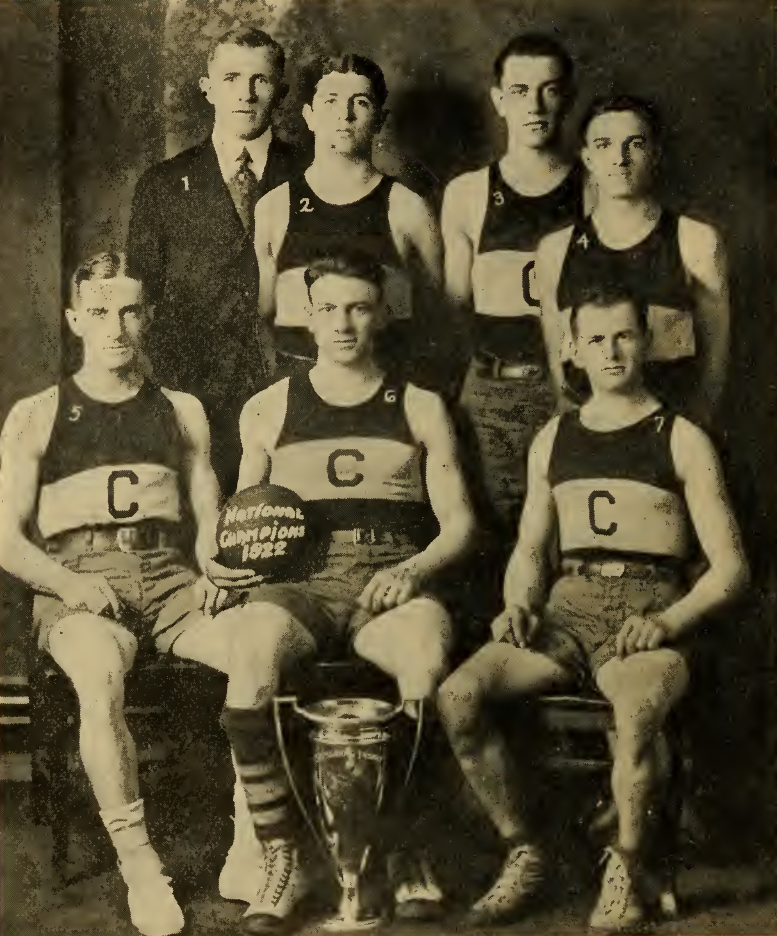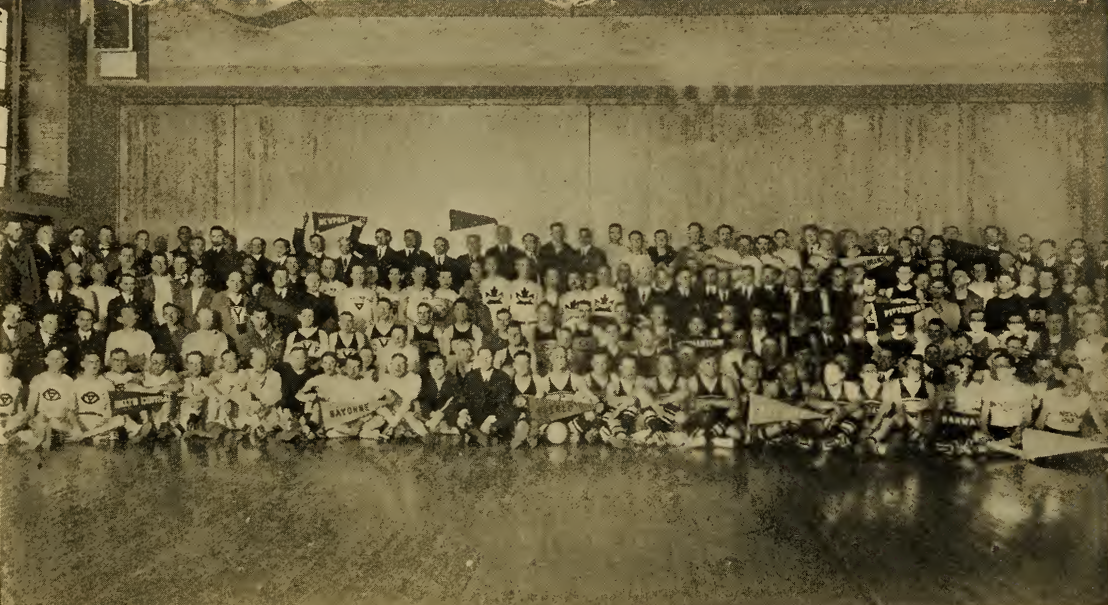The first national championship of volleyball was held in 1922 at the Brooklyn Central Y.M.C.A. in Brooklyn, New York, USA. The event was chronicled in great detail in the 1922-23 Spalding Athletic Library Official Volleyball Rules Book. Excerpts from that publication are used in full or in part throughout this digital exhibit.
The tournament featured 23 teams from 10 states & Canada playing 89 games
Pictured above: Pittsburgh Central YMCA Volleyball Team - winner of the First National Volley Ball Championship of the United States held at Brooklyn, New York, April 28-29, 1922. The Spalding cup is shown in the foreground.
1. Harry A. Batchelor, Physical Director and Coach; 2, John Weible; 3, David Blaney; 4, Steven Myers; 5, Owen Cochran; 6, Edward Maurer, Captain; 7, Louis Emmel.
1. Harry A. Batchelor, Physical Director and Coach; 2, John Weible; 3, David Blaney; 4, Steven Myers; 5, Owen Cochran; 6, Edward Maurer, Captain; 7, Louis Emmel.
|
Pittsburgh Central Y.M.C.A. had the honor of winning the first national championship in volleyball ever held; Germantown's "Big Red Team" was second and the "Big Six" aggregation of Johnstown was third. A fourth Pennsylvania city landed fourth position, the "Sou'westers" of Philadelphia attaining that rank.
While the Keystone State monopolized the places in the initial championship, the entry was not by any means confined to that section of the Union. On the courts of the Brooklyn Central Y.M.C.A., which was the scene of competition, April 28-29, 1922, there were teams from eleven states and some from the Dominion of Canada. Pueblo, Colorado, sent its representatives to the meet and so did Toronto, Ontario. There was also a team from as far East as Newport, R. I., and when players from Colorado are joined by those of New England and Canada and by players intermediate between the Rocky Mountains and New England, it is not difficult to realize the remarkable hold that volleyball has obtained. Twenty-three teams were in the competition and 89 games were played. It was mutually agreed that the final should be a round robin, decided upon a percentage basis. A resolution was adopted at the volley ball dinner which was given at the finish of the tournament by the Central Volley Ball League, and presented to Dr. John Brown, President of the Athletic League, requesting the latter organisation to assume the responsibility for the appearance of volley ball on the schedule of the Olympic Games. The teams participating in the tournament presented Director R. C. Cubbon, of Brooklyn Central Y.M.C.A., who supervised all details of the championship, with a stopwatch.
|
THE FIRST UNITED STATES VOLLEY BALL NATIONAL CHAMPIONSHIP APRIL 28-29, 1922 PARTICIPATING TEAMS: BAY CITY (Michigan) BAYONNE (New Jersey) BEDFORD (New York) BINGHAMTON (New York) BRIDGEPORT (Connecticut) BROOKLYN CENTRAL (New York) *HOST COLUMBUS (Ohio) EVANSVILLE (Indiana) GERMANTOWN (Pennsylvania) GLENS FALLS (New York) JOHNSTOWN (New York) LANCASTER (Pennsylvania) NEW HAVEN (Connecticut) NEWPORT (Rhode Island) PATERSON (New Jersey) PERTH AMBOY (New Jersey) PHILADELPHIA S.W. (Pennsylvania) PHILADEPHIA CENTRAL (Pennsylvania) PITTSBURGH CENTRAL (Pennsylvania) PUEBLO (Colorado) RAHWAY (New Jersey) TORONTO (Canada) WORCESTER (Massachusetts) |
H.A. Batchelor, coach of the champions and physical director of the Pittsburgh Y.M.C.A. Central Branch, is an enthusiastic believer in the possibilities of volley ball. In an interview after the conclusion of the championship contests, Mr. Batchelor said: "I fully realize that many will not agree with me when I state that volley ball is destined to be a greater national game than base ball. If the figures were tabulated for the past year in numbers playing and games played, it would open the eyes of the sporting world. It must be remembered that the game is now being played also in Canada, the Philippines, China, Japan, England, Australia, and other foreign countries.
H. F. Rappold, who captained the "Big Red Team" of the Germantown Y.M.C.A., is not only a player of the first caliber but is also a student of the science of the game. In Mr. Rappold's opinion, what the game needs most of all now is a volley ball officials' association, same as in other branches of sport. These officials should be thoroughly familiar with, the game and not only know every rule but know the reasons for certain rulings. These officials should study the various plays and intricate situations which occur during a game. They should agree on certain specific rulings as provided for in the rule book and insist upon strict interpretation of the official rules. Each community throughout the country should organize an officials' association and the men officiating at tournaments or any other important matches should be selected from the approved list of these associations.
TOURNAMENT RESULTS
In the first round, which was best two out of three, five pairs went to the limit of three games for a decision. Although Philadelphia Southwestern lost in the first round they were the winner in the consolation and competed in the final round against Pittsburgh Central, Germantown, and Johnstown.
WON |
LOST |
SCORES |
Germantown |
Bedford |
15-0, 14-15, 15-9 |
Columbus |
Rahway |
15-14, 14-15, 15-8 |
Lancaster |
Philadelphia S.W. |
15-12, 8-15, 15-7 |
Bridgeport |
Paterson |
15-9, 8-15, 15-6 |
Pittsburgh Central |
Perth Amboy |
12-15, 15-10, 15-11 |
Evansville |
Newport |
15-14, 15-2 |
Bay City |
Bayonne |
15-1, 15-7 |
Philadelphia Central |
Toronto |
15-2, 15-8 |
Johnstown |
Binghamton |
15-8, 15-14 |
Brooklyn Central |
Worcester |
15-2, 15-8 |
Pueblo |
Glens Falls |
15-8, 15-8 |
New Haven, a bye |
In the second round but two of the matches went to three games and Bay City and Johnstown were the winners of those.
WON |
LOST |
SCORES |
Bay City |
Lancaster |
15-14, 10-15, 15-9 |
Johnstown |
Philadelphia Central |
8-15, 15-8, 15-11 |
Germantown |
New Haven |
15-5, 15-11 |
Evansville |
Columbus |
15-2, 15-11 |
Brooklyn Central |
Bridgeport |
15-4, 15-1 |
Pittsburgh |
Pueblo |
15-10, 15-8 |
Up to the semi-finals the games had been good, but when Germantown and Evansville met in the semi-final their match overshadowed everything that had taken place in the tournament. Long experience in the game, combined with excellent passing and non-returnable spiking, gave Germantown well-grounded qualities which were just enough superior to those of Evansville to force that team to defeat, although no easy task. The Evansville players for five years had been the champions of Indiana, but the "Big RedTeam" had even a better record, for in the period between 1912 and 1922 the Germantown players had never lost a series and had a record of one hundred and twenty-five straight victories.
Pittsburgh Central, playing consistently from the start, proved too strong for Brooklyn Central in the semi-final. The latter had displayed resources of excellent team work throughout the series, but were not quite up to the standard of their opponents. Johnstown was too strong for Bay City, champions of Michigan, and forced that team out of the tournament. The Philadelphia Southwestern and Perth Amboy teams, finalists in the consolation round, played an exciting game, in which Philadelphia came from behind, after an almost impossible lead by Perth Amboy, and won.
Pittsburgh Central, playing consistently from the start, proved too strong for Brooklyn Central in the semi-final. The latter had displayed resources of excellent team work throughout the series, but were not quite up to the standard of their opponents. Johnstown was too strong for Bay City, champions of Michigan, and forced that team out of the tournament. The Philadelphia Southwestern and Perth Amboy teams, finalists in the consolation round, played an exciting game, in which Philadelphia came from behind, after an almost impossible lead by Perth Amboy, and won.
WON |
LOST |
SCORES |
Germantown |
Evansville |
15-10, 15-7 |
Pittsburgh Central |
Brooklyn Central |
15-7, 15-6 |
Johnstown |
Bay City |
10-15, 15-5, 15-9 |
Philadelphia S.W. |
Perth Amboy |
15-14, 15-7 |
1st Consolation Round - Results
WON |
LOST |
SCORES |
Bedford |
New Haven |
10-15, 15-6, 15-14 |
Binghamton |
Toronto |
15-10, 15-4 |
Perth Amboy |
Glens Falls |
15-8, 15-3 |
Newport |
Rahway |
15-11, 15-8 |
Worcester |
Paterson |
Forfeit |
Philadelphia S.W. |
Bayonne |
Forfeit |
2nd Consolation Round - Results
WON |
LOST |
SCORES |
Bedford |
Newport |
15-12, 14-15, 15-8 |
Philadelphia S.W. |
Binghamton |
15-10, 15-10 |
Perth Amboy |
Worcester |
15-12, 15-5 |
3rd Consolation Round - Results
WON |
LOST |
SCORES |
Philadelphia S.W. |
Bedford |
8-15, 15-9, 15-8 |
Perth Amboy |
New Haven |
15-4, 15-13 |
4th Consolation Round - Results
WON |
LOST |
SCORES |
Philadelphia S.W. |
Perth Amboy |
8-15, 15-9, 15-8 |
Twenty-three teams were in the competition and 89 games were played. It was mutually agreed that the final should be a round robin, decided upon a percentage basis.
Final Round - Results
Final Round - Results
TEAM |
WON |
LOST |
PERCENTAGE |
Pittsburgh Central |
7 |
2 |
.778 |
Germantown |
6 |
3 |
.667 |
Johnstown |
4 |
5 |
.444 |
Philadelphia S.W. |
1 |
8 |
.111 |
WON |
LOST |
SCORES |
Pittsburgh Central (3) |
Philadelphia S.W. (0) |
15-10, 15-10, 15-5 |
Germantown (2) |
Pittsburgh Central (1) |
15-10, 15-8, 13-15 |
Pittsburgh Central (3) |
Johnstown (0) |
15-9, 15-7, 15-7 |
Germantown (2) |
Johnstown (1) |
11-15, 15-8, 15-9 |
Germantown (2) |
Philadelphia S.W. (1) |
14-15, 15-4, 15-12 |
Johnstown (3) |
Philadelphia S.W. (0) |
15-2, 15-11, 15-12 |




